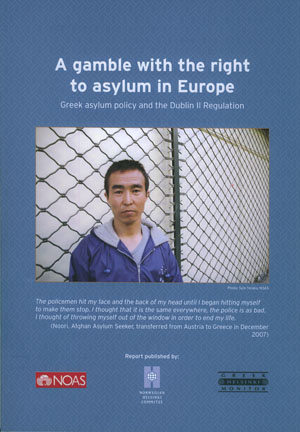A precondition of the Dublin II Regulation was that the examination of whether an asylum seeker needs protection should be approximately equal in all the Member States. As this report will show, this is still just an ambition, far from the realities. Based on our investigations and other available relevant information concerning the situation for asylum seekers in Greece, we consider that the Greek asylum system fails to offer protection for asylum seekers who are in need of it. With regard to legal protection as well as to humanitarian conditions, the situation for asylum seekers in Greece is alarming.
Greek asylum policy is better understood if one considers the following:
- Keeping asylum seekers in police custody is a common practice, and we were told several stories of asylum seekers being abused while detained by the police. It is unacceptable that some of those fleeing from persecution in their home country are beaten up by the police in an EU state instead of receiving help and protection.
- 25.113 asylum applications were submitted in 2007, but the authorities have dedicated very 2. limited resources to handle them, which is yet another example of Greece’s reluctance to deal with asylum according to its international obligations.
- From more than 20,000 asylum cases that were given first instance examination in 2007 only 8 persons were given residence permit, 0.04 per cent of the applicants. 17,000 decisions were appealed, of which 6,448 were examined. Only 155 applications were granted, after the examination of appeals, that is 2.4 percent. These are depressing figures.
- Very few asylum seekers are given legal assistance in Greece, even if they are entitled to this. Access to legal assistance is all the more important given the low percentage of applications that are granted. The number of lawyers to whom NGOs mediate access, approximately 15, is not in proportion to the need.
- Unaccompanied minors are not guaranteed a place at a reception centre, nor education, legal guardian or other assistance they are entitled to through the UN Children’s Convention.
- Approximately 750 available places at reception centres are far from sufficient. The majority of asylum seekers are left to fend for themselves, as best they can.
It is impossible to respect the asylum seekers’ legal protection and fundamental social rights with resources as limited as those made available by Greek authorities. For instance, only 10-12 police officers are assigned to interview more than 20,000 asylum seekers arriving in Greece in the course of a year. The asylum interviews are therefore very short and superficial. Most of the asylum seekers we have talked to told us that authorities used between two and five minutes to interview them, and that the grounds for seeking asylum were not the main topic. Furthermore, these were among the lucky ones who got access to the asylum procedure at all, for it is difficult for asylum seekers to even lodge an application for asylum in Greece.
The extremely low percentage of granted applications in reality entails that asylum seekers that would have been granted asylum or subsidiary protection in other European countries, are not receiving this in Greece. It is therefore understandable that many asylum seekers do not primarily want to claim asylum in Greece, but prefer to move on to another European country. It appears that the strategy of Greek authorities is exactly to deter asylum seekers from coming to Greece. However, because they are detained while illegally crossing the Greek border, their cases are to be treated in Greece due to the Dublin II Regulation. This appears as an unjust arrangement, both for the asylum seekers and for Greece, as one of Europe’s “frontier states”. The hopeless situation of the asylum seekers was succinctly expressed by an Afghan we spoke with in Athens: “We are neither given help in Greece, nor given the possibility to try our chances in another European country”.
In our opinion the deficiencies in the Greek asylum process, documented through this report, entail that there is a discord between the preconditions on which the Dublin II Regulation was founded and procedural practices followed in Greece. In our opinion the Greek system does not guarantee even minimum basic legal protection for the asylum seekers.
Based on our findings, we consider it evident that, at the time being, it is not safe to transfer asylum seekers to Greece in accordance with the Dublin II Regulation. Member States have an independent responsibility to initiate investigations and implement measures necessary to fulfil international human rights obligations.
It is our hope that this report can contribute to this. We also remind that some countries transferring asylum seekers to Greece might themselves become guilty of breaches of international human rights obligations.
We call on all the countries participating in the Dublin cooperation to start applying the Sovereignty Clause of the Dublin II Regulation (art. 3(2)) in all asylum cases that Greece would otherwise be responsible for in accordance with the Regulation.
We call on Greek authorities to review their asylum policy so that it complies with its international obligations.
